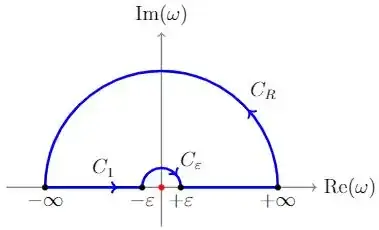One intermediate step of an exercise requires to evaluate the the following integral with variable $\omega\in\mathbb{C}$, $$ \lim_{\varepsilon\to0^+}\int_{C_\varepsilon}\frac{e^{i\alpha\omega}}{\omega^2}\mathrm{d}\omega \quad\text{with}\quad \alpha>0 \tag{1} $$ where $C_\varepsilon$ is the upper semi-circular arc centered at origin and with radius $\varepsilon\to0^+$. The full contour (indented upper semi-circle) used in this exercise is shown below:
Because the pole of the integrand at $\omega=0$ is not a simple pole (it is of order 2), the corollary to the Jordan's lemma is not applicable. Have tried substituting $\omega=\varepsilon e^{i\theta}$ and Mathematica, I get
$$
\begin{aligned}
\int_{C_\varepsilon}\frac{e^{i\alpha\omega}}{\omega^2}\mathrm{d}\omega
&= \int_\pi^0\frac{\exp{({i\alpha \varepsilon e^{i\theta}})}}{\varepsilon^2 e^{2i\theta}}\varepsilon i e^{i\theta}\mathrm{d}\theta \\
&= \frac{i}{\varepsilon}\int_\pi^0\exp{[i({\alpha \varepsilon e^{i\theta}}-\theta)]}\mathrm{d}\theta \\
&=-\frac{2}{\varepsilon}\cos{(\alpha\varepsilon)}
+i\alpha\left[
\mathrm{Ei}(i\alpha\varepsilon)-\mathrm{Ei}(-i\alpha\varepsilon)
\right]
\end{aligned}
\tag{2}
$$
where $\mathrm{Ei}(z)$ is the exponential integral function. At the last step I don't know how to proceed, as the function value is of the indeterminate form $\infty+i\infty-i\infty$ as $\varepsilon\to0^+$.
Using regularization method via $\omega^2\to(\omega+i\varepsilon)^2$, I can show that $$ \lim_{\varepsilon\to0^+}\oint_C\frac{e^{i\alpha\omega}}{(\omega+i\varepsilon)^2}\mathrm{d}\omega = 0 \Longrightarrow \oint_C\frac{e^{i\alpha\omega}}{\omega^2}\mathrm{d}\omega = 0 $$ where $C=C_1+C_R$ is the upper semi-circle without the indent at origin. The contour integral $\int_{C_R}=0$ due to Jordan's lemma, and thus $\int_{-\infty}^\infty=0$. With this observation, I believe the integral in (1) should be zero as well, but I don't know how to proceed from (2).
Could anyone provide some hints? Many thanks.
